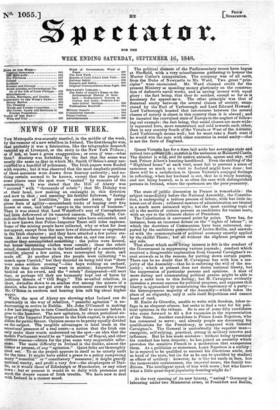The state of .public discussion in France is remarkable :
the subject immediately before the National Assembly, the Constitu- tion, is undergoing a tedious process of debate, with but little in- terest out of doors ; collateral matters of administration are treated in.a much more animated style ; but the most exciting topic of all is the merits of certain persons as candidates for vacant seats, with an eye to the ultimate choice of President. The Constitution is canvassed point by point. There has, for instance, been an immense debate on the rights of labour "; in which the doctrines of Communism have been reiterated, sup- ported by the ambitious generalities of Ledru-Rollin, and answer- ed with the commonplaces of political economy smartly applied by the skilful Thiers ; but all without the slightest progress on any side.
That about which moil. living interest is felt is the conduct of the Government in suppressing various journals conduct which received a disagreeable explanation from General Cavaignac's re- cent avowals as to the reasons for putting down certain papers. There can be no doubt that M. Cavaignac has with him a ma- jority of the Assembly—that he is enforcing the will of the ma- jority ; which at present does not desire national liberty, but the suppression of particular persons and opinions. A man of more daring and commanding political genius might be able to give a safer turn to this feeling; but M. Cavaignac evidently mistakes a present success for political progress, and supposes that liberty is approached by maintaining the supremacy of a party— the heterogeneous majority of the Assembly—which takes the place of an oligarchy, only it calls itself Republican and cannot boast of rank.
M. Emile de Girardin, unable to write with freedom, takes re- fuge in an eloquent silence, but seeks to find a vent for his poli- tical opinions in the tribune. He is one of some fifty candidates who come forward to fill a few vacancies in the representation of the Seine. Another candidate is Prince Louis Napoleon, who has consented to serve ; and already people are discussing his qualifications for the Presidency, as compared with General Cavaignac's. The General is undoubtedly the superior man— energetic, self-relying, practical, strong in military renown and influence. But he has made mistakes : without being tyrannical his conduct has been despotic ; he has joined an austerity which provokes the sensitive French to a moderation that exasperates them. As a politician or statesman, Louis Napoleon is a nullity : he is reputed to be qualified to succeed his illustrious uncle, not as head of the state, but (so far as he can be qualified by studies) as officer of artillery : however, he is like his uncle in face, has the immoveable countenance, the imperial name, the family tra- ditions. The intelligent speak of him with scorn ; but who knows what a little quasi-royal popularity-hunting might do ?


























